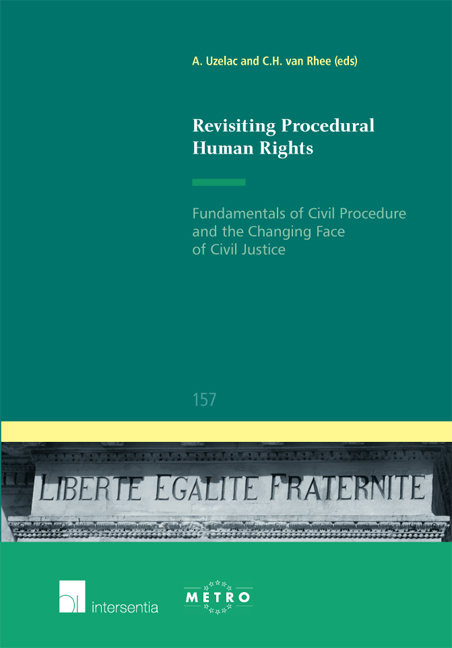 Revisiting Procedural Human Rights
Revisiting Procedural Human Rights Book contents
- Frontmatter
- Table of Contents
- List of Authors
- List of Abbreviations
- Acknowledgements
- Introduction
- The Human Right to Accessible and Foreseeable Justice
- The Inconsistency of Case Law and the Right to a Fair Trial
- Misgivings about American Exceptionalism: Court Access as a Zero-Sum Game
- Should Fair Trial Rights be Redefined? Civil Litigation as a Societal Discussion
- Fundamental Procedural Rights from a National Angle
- Wheels of History: Fair Trial Rights in Historical Perspective
- Equal Justice for all: Empirical and Normative Approaches to Legal Aid and Assistance in Civil and Administrative Cases
- Ius Commune Europaeum
Misgivings about American Exceptionalism: Court Access as a Zero-Sum Game
from The Human Right to Accessible and Foreseeable Justice
Published online by Cambridge University Press: 13 October 2018
- Frontmatter
- Table of Contents
- List of Authors
- List of Abbreviations
- Acknowledgements
- Introduction
- The Human Right to Accessible and Foreseeable Justice
- The Inconsistency of Case Law and the Right to a Fair Trial
- Misgivings about American Exceptionalism: Court Access as a Zero-Sum Game
- Should Fair Trial Rights be Redefined? Civil Litigation as a Societal Discussion
- Fundamental Procedural Rights from a National Angle
- Wheels of History: Fair Trial Rights in Historical Perspective
- Equal Justice for all: Empirical and Normative Approaches to Legal Aid and Assistance in Civil and Administrative Cases
- Ius Commune Europaeum
Summary
Introduction
Everyone knows about American procedural exceptionalism. Indeed, it seems that American exceptionalism extends beyond procedure into other important bodies of law. A strong justification for this exceptionalism is that it affords unparalleled access to justice by guaranteeing that those who seek relief in court have the means and ability to obtain that relief. Indeed, it is so forceful that Professor Huang, a Korean scholar, wrote a whole book a decade ago urging that civil law systems switch to American ways of handling discovery and burden of proof to enable access to justice. He was forceful in his critique of the civil law process:
To put it bluntly, it is bizarre that while the [continental civil law] system tolerates fact-finding based on an information database that is far more insufficient than that of the common law system, it requires the facts to be established by a standard of proof that is far higher than the common law one.
To date, that broad challenge has not been taken up.
But that does not mean nothing has changed. To the contrary, American federal-court procedure (the original stimulus for much of the current exceptionalism in American procedure) has for several decades been the subject of repeated reform efforts, mainly by formal rule changes but also on occasion in judicial decisions. It is fair to say that this reform has tended to constrain and contain some of the most aggressive aspects of American procedure. European procedure seems, during this time, to have undergone some changes that may make it resemble American procedure a bit more. Both reform trends may be justified as methods of improving access to justice and protection of rights.
This contribution reports on the tenor of relatively recent American reform efforts, which may strike those from the rest of the world as surprising because they urge that access to justice, at least in terms of procedural arrangements, is something of a zero-sum game, a game theory construct in which a gain by one side can be had only if there is a corresponding loss by the other side. That seems a peculiar attitude to take toward procedure, which is designed in general to enable just results. Indeed, that is a central assumption of Professor Huang's book endorsing the adoption of American discovery and related concepts in the rest of the world.
- Type
- Chapter
- Information
- Revisiting Procedural Human RightsFundamentals of Civil Procedure and the Changing Face of Civil Justice, pp. 53 - 76Publisher: IntersentiaPrint publication year: 2017
- 1
- Cited by


